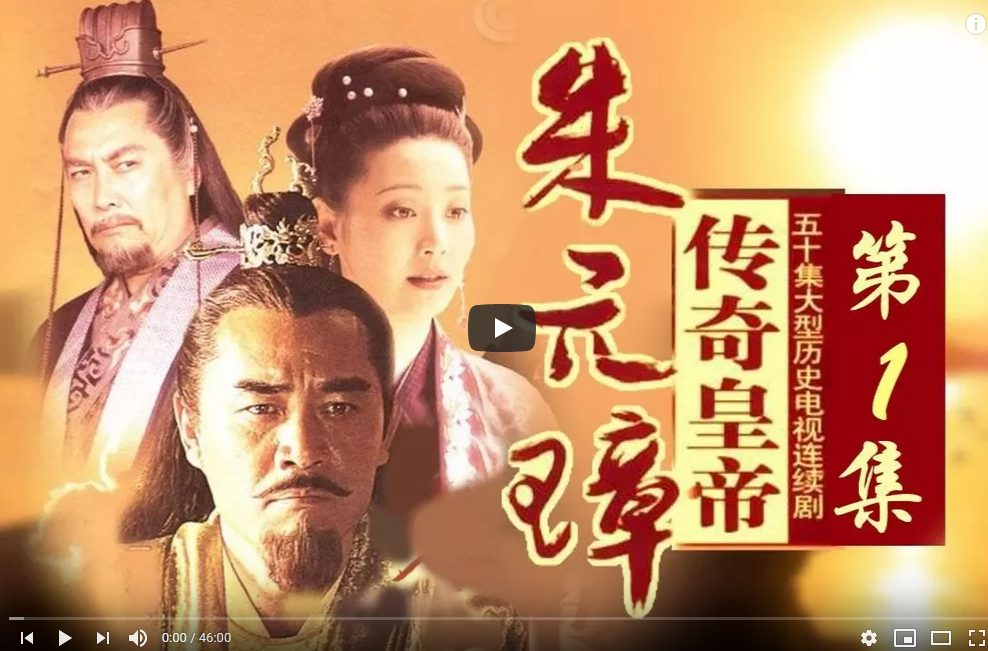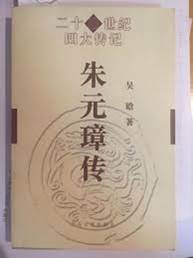“What’s a nice Jewish girl like you doing writing about the Ming founding?”

A California-based literary agent once asked me this after I proposed a novel about the story of the fourteenth-century Ming Dynasty founder, Zhu Yuanzhang.
How to reply?
I mentioned that I’m not actually Jewish, but I knew that was not the point of the question. The agent was trying to tell me that he thought it strange to hear the idea for such a book coming from someone who is not Chinese.
Maybe it is strange. And, needless to say, that agent didn’t bite.
But what I found stranger, as I was researching the Ming, is the fact that this incredible story is missing from the category of historical fiction written in English. Genghis Khan yes. Empress Dowager Cixi yes. Liu Bei and Cao Cao yes and yes. Empress Wu yes. Zhu Yuanzhang no.
Now, China has had a lot of dynasties, and each one of them had a founder with a strong personality. But even among the lists of all Chinese rulers, to say nothing of founders, Zhu Yuanzhang stands out. He rose from impoverished goat herder to the Dragon Throne. He survived the pox and the plague. He welcomed military innovations and launched what one modern scholar has heralded as “the world’s first gunpowder empire.” He defeated the Mongols and all other contenders during an era of warlords. He reigned from 1368-98, sired 26 sons, and his dynasty lasted for 276 years.
Americans know about Ming vases and Ming furniture. Why haven’t they heard of the Ming founder?

It’s not like Chinese writers and historians and filmmakers have not done their part for this guy. I know of 35 television series that focus on Zhu Yuanzhang. I have a bookshelf of stories, sayings, comic books and scholarship about him. He wrote his own autobiographical essay. A work of historical fiction set in the Ming founding is listed among the (minor) classics of Chinese literature.
The problem is that all the items I just cited are 用中文寫的. Zhu Yuanzhang, powerful emperor and barrier breaker, has not found a way over the language hurdle.
Maybe it’s all the Z’s in his name. Maybe it’s a curse that scholars placed on his head for destroying so many of their ranks once he became emperor. Whatever the reason, I decided to offer my own version of the stranger-than-fiction Ming founding story. I could never write it in Chinese, which is not my native tongue. However, after decades of studying the rich language (a shout-out to all my inspiring teachers, starting with Wang Laoshi way back in high school) that is Chinese, in its modern and classical forms, I have finally gotten to the point of being able to read and admire – and even gain insights and perspectives from – some of the amazing tales and epic histories that are only available in Chinese. The Ming founding is one example.

The Lacquered Talisman, the first in my planned series, is based primarily on Zhu Yuanzhang’s 96-line rhymed life story, written in 1378, and annotated in 1988 by a scholar from his hometown, Wang Jianying. I also relied heavily on the scholarship of Romeyn Taylor and Hok-lam Chan in the U.S., along with selections from the vast supply of Ming primary sources, and the interpretation of Zhu’s life presented recently by Anhui local historian Xia Yurun. Another key source for me was the biography penned over decades of the tumultuous 20th century by Chinese historian/politician Wu Han.
The rhymed life story, titled the Imperial Tomb Tablet of the Great Ming 大明皇陵之碑, is a fascinating piece of literature that I think should be required reading for all students of world history. Zhu Yuanzhang was busy when he founded his dynasty in 1368, so he asked a respected scholar to ghost write his autobiography, which the new emperor wanted carved into stone and mounted in front of his parents’ graves for all eternity to read. But when the emperor went to see the finished product, he was not impressed. As he put it, “I realized the original text for the Imperial Tomb Tablet had been embellished by the Confucians ministers to the point that I feared it would not sufficiently admonish later generations and descendants.”
Take it down, the emperor ordered. He picked up his own brush and wrote out the version that still stands today in northern Anhui Province.

I have gazed in awe at this enormous, cracked piece of rock, with its worn columns of characters. Poring over the text, I realized that Zhu Yuanzhang did not call himself a rebel or use the phrase “Ming Dynasty.” He didn’t get around to the glories of his rise until line 60. Instead, his focus was on his family’s suffering. He wanted the world to understand the sacrifices his parents made and the hardship of having his family torn apart by poverty and pestilence. He wanted his descendants, who he knew would live in palaces, to remember that he and his fellow villagers were reduced to eating bark to survive the drought years. He wanted to make clear that when his family had no place to bury their dead in the midst of an epidemic, an evil landlord turned him away, but then that landlord’s brother took pity “and kindly offered some yellow earth.” Where’s the grave of that evil landlord today? His name is only known to history because Zhu Yuanzhang exposed it.
The first 53 lines of the Imperial Tomb Tablet provide the framework for my novel, The Lacquered Talisman. I have translated all 96 into English, with annotations for each line, and made this translation available as a free PDF download. Mine is the only complete English translation available, which I find strange.

Wu Han’s Biography of Zhu Yuanzhang 朱元璋传, is another fascinating source. Like Zhu Yuanzhang in the early 1300s, Wu Han lived in tumultuous times. He finished the first version of his biography in 1944, writing without access to his own library in Beijing, since he was living with scholar refugees who had fled the Japanese occupation and landed far to the south in Kunming. Wu intended from the beginning to write a popular book, and when he was able to get back to Beijing, he added notes and citations and made various changes, but held on throughout to the vivid, page-turning feel of this life story. Here’s how he described his subject in the opening chapter on the founder’s youth: “Yuanzhang had grown into a boy of large stature, with a dark visage, and a jaw that jutted out well beyond his upper lip. He had high cheekbones, and his nose and ears were quite large. When taking in his entire face, it resembled a three-dimensional version of the character for ‘mountain (山)’ set sideways, with a bony lump in his forehead like a hillock. His eyebrows were thick and his eyes protruded. His appearance, while unappealing, nonetheless had a strange kind of balance; it was quite awe-inspiring and composed.”
Wu Han consulted with such experts in uprisings as Chairman Mao Zedong as he perfected his manuscript. The published book remains an authoritative text and indeed has been hailed as among the best biographies written by a modern Chinese author. It required a few years for me to digest, dictionaries in hand, because — alas — no translation is available in English.

Wu Han published his book in 1965, as the Cultural Revolution was breaking out. Some thought his book on Zhu was actually about Mao. The infamous “Gang of Four” charged him with denying “the great function of the peasant uprising.” This in a story about a goat-herder who rose through the ranks of the Red Turbans to storm the throne. Truth then, as now, could be twisted to serve the purposes of those in power. Wu Han died in prison in 1969, one of the first victims of the Cultural Revolution.
Why would he publish a biography of one of China’s most powerful emperors at such a politically sensitive moment? Scholars have asked this question, and I personally would assume he could not stop himself. As historian Mary Mazur has pointed out, Wu Han was fascinated with how the past shaped the present, and both he and Mao Zedong “understood that Zhu Yuanzhang was key figure in China’s past who had great relevance to the present goal of formation of the new revolutionary Chinese state.”
It is no small irony that Wu Han’s life work — which described an emperor known for his own purges and which destroyed its author in a purge — survived the Red Guards. Today, Wu Han’s biography is widely available across China in reprint after reprint. The story of Zhu Yuanzhang is popular there, in no small part, because Wu Han told it so well.

So why did a person like me decide to write a novel about a topic like the Ming founding? Because I learned from Wu Han the power of storytelling for talking about Zhu Yuanzhang, and I learned from the founder himself that it’s not in the glories but the despair that his story can best be understood. That’s a task well suited for fiction.
It’s been my strange fate to become engrossed in this life story. The more I learn about Zhu Yuanzhang, the more relevant his life seems to my modern world. I wish his name was easier to pronounce in English. I hope my work is worthy of his legacy. Meanwhile, I’m two-thirds through Book Two.

Very interesting, especially about Wu Han and Mao and the Cultural Revolution. I shudder to think how many cultural/historical treasures were lost during that period. Bonnie Cronin
LikeLiked by 1 person
Funny: My “Historical Novels Review” arrived today with a superb review of your book, and now here you are again on WordPress. Perhaps the forces of brightness are converging.
LikeLiked by 1 person